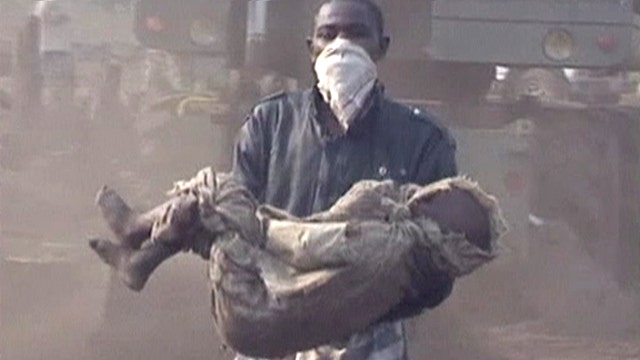Rwanda: 20 years after genocide
Roughly 800,000 people were killed as rival groups in the African nation engaged in a three month killing spree
A prominent financier suspected of bankrolling the Rwandan Genocide is set to face trial for charges of human rights violations after running from authorities for more than two decades.
Félicien Kabuga, a businessman suspected of funding militias in the Rwanda genocide, was arrested by French police in 2020.
Kabuga will stand trial on Sept. 29 at The Hague in the Netherlands.
RWANDA FINDS GENOCIDE GRAVE THAT COULD CONTAIN 30,000 BODIES

A French Gendarme stands guard next to a prison van transporting Felicien Kabuga, one of the last key fugitives wanted over the 1994 Rwandan genocide, at the Paris court on May 19, 2020. (PHILIPPE LOPEZ/AFP via Getty Images)
Kabuga was arrested in Asniéres-sur-Seine, outside Paris, where he had been living under a false identity, officials said.
The 84-year-old had been in hiding for 23 years after the International Criminal Tribunal for Rwanda indicted him on charges including genocide and incitement to commit genocide.
US DRONE STRIKE KILLS 13 AL-SHABAB FIGHTERS IN SOMALIA
Kabuga is suspected to have been the main financier of the ethnic Hutu extremists who slaughtered 800,000 people in 1994. The arrest brings Kabuga to the Paris Appeals Court before authorities hand him over to the tribunal.
Before his apprehension, the United States had offered a $5 million reward for information leading to Kabuga’s arrest.

A red cross is seen drawn on the face of Augustin Bizimana (R), one of the most-wanted fugitives from the 1994 Rwandan genocide, next to the red-crossed face of Felicien Kabuga (L), who was arrested last week in Paris, on a wanted poster at the Genocide Fugitive Tracking Unit office in Kigali, Rwanda, on May 22, 2020. (SIMON WOHLFAHRT/AFP via Getty Images)
CLICK HERE FOR THE FOX NEWS APP
Rwanda's genocide began hours after a plane carrying President Juvenal Habyarimana was mysteriously shot down as it approached the capital, Kigali, on April 6, 1994.
The 100-day slaughter, in which more than 500,000 minority Tutsis and moderate members of the Hutu majority were killed by Hutu extremists, ended after Tutsi-led rebels ousted the extremist Hutu government that orchestrated the killings.
The Associated Press and Frank Dorman contributed to this report.

